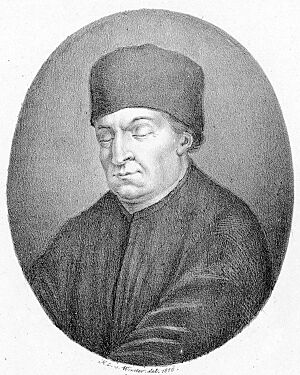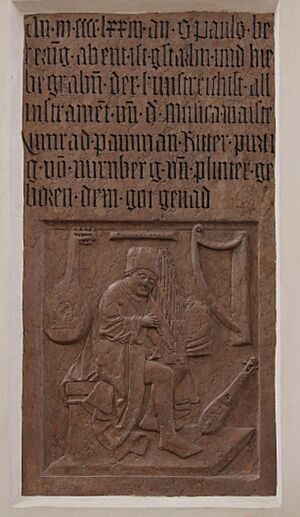Conrad Paumann facts for kids
Quick facts for kids
Conrad Paumann
|
|
|---|---|

Paumann (later 19th? century engraving)
|
|
| Background information | |
| Born | c. 1410 Nuremberg, Germany |
| Died | January 24, 1473 (aged 62–63) |
| Genres | Renaissance |
| Occupation(s) | Instrumentalist, composer |
| Instruments | Pipe organ, lute |
Conrad Paumann (around 1410 – January 24, 1473) was a German musician. He was an amazing organist, lutenist, and composer. He lived during the early Renaissance period.
Conrad Paumann was blind from birth. Despite this, he became one of the most talented musicians of the 1400s. People were always amazed by his performances. He is known as one of the "Colorists" in music history.
Contents
Conrad Paumann's Life Story
Conrad Paumann was born in Nuremberg, Germany. His family worked as craftsmen. He showed a great talent for music very early on. Important people helped him get an excellent music education.
In 1447, he became the official organist for the city of Nuremberg. The city leaders even told him he could not leave without their permission.
Traveling Musician
Paumann was very talented but also wanted his freedom. He secretly left Nuremberg in 1450. He traveled to Munich. There, Duke Albrecht III immediately hired him as his court organist. The Duke even gave Paumann a house!
Munich became his official home for the rest of his life. However, he started to travel a lot. He went to many places, and everyone was surprised by his musical skills. His fame as a performer and composer grew.
Famous Performances
We don't have exact records of all his travels. But we know he went to many cities. He was always welcomed with great excitement. Both Milan and Naples offered him good jobs.
He likely traveled in Italy around 1470. At that time, the Sforza family in Milan was building a famous music center. Many great composers like Josquin des Prez were there. Some of them might have heard Paumann play. They may have even shared musical ideas.
In Mantua, he was made a knight. In Landshut, he played for Duke Philip the Good of Burgundy. He also performed for Emperor Frederick III in Ratisbon. During these travels, he also taught many students.
Paumann's influence was huge. He helped German organ playing and composing grow. This tradition later led to the work of J.S. Bach in the 1700s.
Paumann's tombstone is in the Munich Frauenkirche. It says:
Anno 1473, on the evening of St. Paul's conversion died and was here buried the most ingenious master of all instruments and music, Cunrad Pauman [sic], knight, born blind at Nuremberg, God have mercy upon him.
Paumann's talent, his blindness, his instrument, and his influence remind us of Francesco Landini. Landini was a great Italian composer who lived a hundred years before Paumann.
Paumann's Music and Impact
Since Paumann was blind, he never wrote down his own music. He was probably best at making up music on the spot, which is called improvisation.
He is thought to have invented the system of tablature for the lute in Germany. Tablature is a way to write music that shows where to place your fingers on an instrument. This idea makes sense because of Paumann's influence. It also makes it easier for someone to tell others how to play music without writing it down in traditional notes.
Most of his music was for instruments. Some of it was very difficult to play, showing off his amazing skill. Only one song with singing still exists. It's a tenorlied called Wiplich figur for three voices. This song sounds very much like music from the Franco-Flemish composers of his time. This means Paumann knew their music. He probably heard it during his travels, like when he went to Milan.
 | William Lucy |
 | Charles Hayes |
 | Cleveland Robinson |


